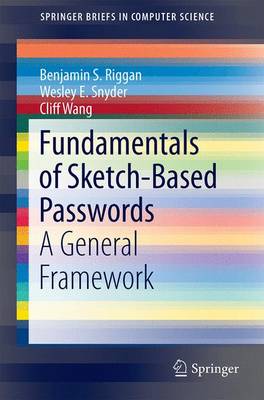SpringerBriefs in Computer Science
2 total works
Fundamentals of Sketch-Based Passwords
by Benjamin S. Riggan, Wesley E. Snyder, and Cliff Wang
Published 1 January 2015
This SpringerBrief explores graphical password systems and examines novel drawing-based methods in terms of security, usability, and human computer-interactions. It provides a systematic approach for recognizing, comparing, and matching sketch-based passwords in the context of modern computing systems. The book offers both a security and usability analysis of the accumulative framework used for incorporating handwriting biometrics and a human computer-interaction performance analysis. The chapters offer new perspectives and experimental results regarding model uniqueness, recognition tolerance, and the human-computer interaction. The results demonstrate that biometrics reduce the equal error rate (EER) by more than 10%, and show that people are capable of accurately reproducing a sketch-based password. Fundamentals of Sketch-based Passwords: A General Framework targets computer scientists and engineers focused on computer security, biometrics, and human factors. Advanced-level students in computer science and electrical engineering will find this material useful as a study guide for their classes.
Modeling and Evaluating Denial of Service Attacks for Wireless and Mobile Applications
by Zhou Lu, Wenye Wang, and Cliff Wang
Published 18 November 2015
This SpringerBrief covers modeling and analysis of Denial-of-Service attacks in emerging wireless and mobile applications. It uses an application-specific methodology to model and evaluate denial-of-service attacks. Three emerging applications are explored: multi-modal CSMA/CA networks, time-critical networks for the smart grid, and smart phone applications.
The authors define a new performance metric to quantify the benefits of backoff misbehavior and show the impacts of a wide range of backoff mishandling nodes on the network performance, and propose a scheme to minimize the delay of time-critical message delivery under jamming attacks in smart grid applications. An investigation on the resilience of mobile services against malware attacks is included to advance understanding of network vulnerabilities associated with emerging wireless networks and offers instrumental guidance into the security design for future wireless and mobile applications.
This book is appropriate for students, faculty, engineers, and experts in the technical area of wireless communication, mobile networks and cyber security.
The authors define a new performance metric to quantify the benefits of backoff misbehavior and show the impacts of a wide range of backoff mishandling nodes on the network performance, and propose a scheme to minimize the delay of time-critical message delivery under jamming attacks in smart grid applications. An investigation on the resilience of mobile services against malware attacks is included to advance understanding of network vulnerabilities associated with emerging wireless networks and offers instrumental guidance into the security design for future wireless and mobile applications.
This book is appropriate for students, faculty, engineers, and experts in the technical area of wireless communication, mobile networks and cyber security.

